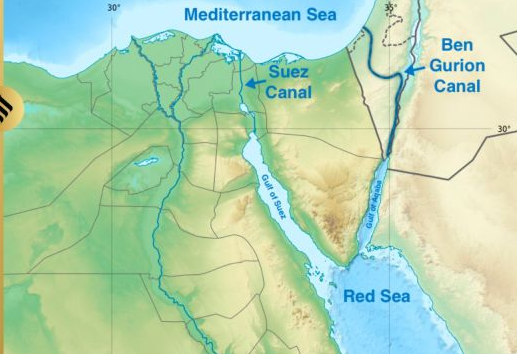Important Facts For Prelims
Ben Gurion Canal Project
- 16 Nov 2023
- 5 min read
Why in News?
Recently, there has been renewed interest in the Ben Gurion Canal Project, a proposed 160-mile-long sea-level canal that would connect the Mediterranean Sea with the Gulf of Aqaba, bypassing the Suez Canal.
What is the Ben Gurion Canal Project?
- Historical Roots:
- Originating in the 1960s, the Ben Gurion Canal Project was conceptualized as a transformative infrastructure initiative.
- Named after Israel's founding father, David Ben-Gurion (1886-1973), reflecting its historical significance.
- Strategic Objective:
- Aims to create an alternative maritime route connecting the Red Sea with the Mediterranean, bypassing the Suez Canal.
- Envisions reshaping global maritime dynamics by challenging Egypt's monopoly on the shortest Europe-Asia route.
- Gulf of Aqaba to Mediterranean Coast:
- Proposes cutting a canal through the Negev Desert (Israel), starting from the Gulf of Aqaba (eastern arm of the Red Sea).
- Extends to the Eastern Mediterranean coast, providing an alternative trade route.
- The Gulf of Aqaba has a coastline shared by four countries: Egypt, Israel, Jordan, and Saudi Arabia.
- Proposes cutting a canal through the Negev Desert (Israel), starting from the Gulf of Aqaba (eastern arm of the Red Sea).
- Economic Implications:
- Speculations suggest that Israel's desire to control Gaza and eliminate Hamas is linked to unlocking economic opportunities tied to the canal.
- If completed, the Ben Gurion Canal Project would have a significant impact on global trade and geopolitics. It would create a new shipping route between Europe and Asia, bypassing the Suez Canal and reducing Egypt's control over global shipping.
- Challenges and Viability:
- Gigantic logistical, political, and funding challenges pose substantial obstacles.
- High complexity and prohibitive costs estimated to be as much as USD 100 billion.
- The imperative of political stability and the constant military threat as significant security concerns.
- Another challenge is the security situation in the region. The Gaza Strip is a potential security threat, and any canal would need to be protected from attack.
- Gigantic logistical, political, and funding challenges pose substantial obstacles.
Suez Canal
- The Suez Canal is a man-made waterway that opened in 1869 running north to south across the Isthmus of Suez in Egypt, that connects the Mediterranean Sea and the Red Sea, allowing a shorter route for shipping between Europe and Asia.
- The canal separates the African continent from Asia.
- The 150-year-old canal was controlled by British and French interests in its initial years, but was nationalised in 1956 by Egypt.
- The Suez Canal now is controlled by Egypt, which collects toll revenues from the vessels that use it.
- In 2021, the canal generated a record of USD 9.4 billion for Egypt, accounting for nearly 2% of its GDP.
- The Suez Canal is a vital trade route that accounts for approximately 12% of global trade passes through the Suez Canal, representing 30% of all global container traffic, and over USD 1 trillion worth of goods per annum.
- The canal enables India to access the markets of Europe, Africa, and the Middle East more easily and economically.
- India imports most of its oil and gas from the Gulf countries, and the canal facilitates the smooth flow of energy supplies to India.
- The canal also helps India export its products, such as textiles, chemicals, and agricultural goods, to the global markets.
UPSC Civil Services Examination, Previous Year Question (PYQ)
Prelims
Q1. The Mediterranean Sea is a border of which of the following countries? (2017)
- Jordan
- Iraq
- Lebanon
- Syria
Select the correct answer using the code given below:
(a) 1, 2 and 3 only
(b) 2 and 3 only
(c) 3 and 4 only
(d) 1, 3 and 4 only
Ans: (c)
Q2. Which one of the following countries of South-West Asia does not open out to the Mediterranean Sea? (2015)
(a) Syria
(b) Jordan
(c) Lebanon
(d) Israel
Ans: (b)





